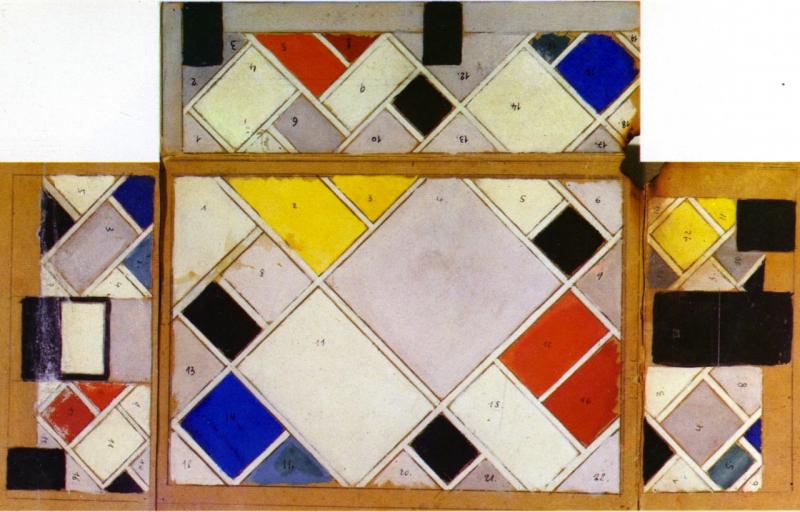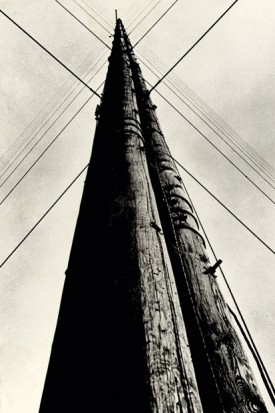Adventures of the Black Square: Abstract Art and Society 1915-2015, Whitechapel Gallery | reviews, news & interviews
Adventures of the Black Square: Abstract Art and Society 1915-2015, Whitechapel Gallery
Adventures of the Black Square: Abstract Art and Society 1915-2015, Whitechapel Gallery
An exhibition about how geometric abstraction took over the world loses the plot

From an apparently simple idea stems a very confusing exhibition. Here’s the idea: taking the seminal black square painted by Russian artist Kazimir Malevich as its starting point – in fact, a rectangle, with the small and undated Black Quadrilateral the first of three Malevich paintings – we are invited, over the span of a century and across a number of continents, to explore the evolution of geometric abstraction and its relation to “ideas of utopia”.
So far so good. Or maybe not. Perhaps the time frame hints at the problem: the way it jumps, without pause, from those modernist isms with their big ideas and proceeds to chuck everything but the kitchen sink at it. There are so many artists I’ve never heard of in this baggy, over-curated, over-extended display, all clamouring to say something tangential about abstraction, figuration, architecture, design, squares and circles, each from their own time perspective (modernism, conceptualism, performance, post-modernism, post-post-modernism) that you wonder at what point the curators got so carried away and lost the plot.
All these ideas are interrelated, of course, because that’s how ideas in art work, but I also wonder what, meaningfully, a piece of Dada theatre by Oskar Schlemmer has to do with Lebanese artist Saloua Raouda Choucair’s stack of brick-like forms from 1965, or what either has, really, to do with the starting premise. Or what the Islamic tradition of non-representational art has to do with Western modernism in anything but the most superficial way (“Look, shapes”?). The trouble is, this is an exhibition that wants to say one big thing and ends up saying lots of little things with diminishing returns. And there are so many problems with that that it’s difficult to know where to begin.
 And, of course, one can make so many of the same points by just looking at the course of figurative art and political engagement in the 20th century – from utopia to disenchantment and back again. It’s easy – we can all play this curatorial game and get lost in a spaghetti-junction of half-baked ideas but from a completely different starting point. And in fact there’s a surprising amount of figurative work in this exhibition: photographs of modernist buildings and radio towers and corporate office interiors; paintings of loudspeakers à la Rodchenko; and lots and lots of performance pieces taking us to the present day. (Pictured right: Aleksandr Rodchenko, Radio Station Tower, 1929)
And, of course, one can make so many of the same points by just looking at the course of figurative art and political engagement in the 20th century – from utopia to disenchantment and back again. It’s easy – we can all play this curatorial game and get lost in a spaghetti-junction of half-baked ideas but from a completely different starting point. And in fact there’s a surprising amount of figurative work in this exhibition: photographs of modernist buildings and radio towers and corporate office interiors; paintings of loudspeakers à la Rodchenko; and lots and lots of performance pieces taking us to the present day. (Pictured right: Aleksandr Rodchenko, Radio Station Tower, 1929)
What’s more, we end with an installation piece by Heimo Zobernig showing a plaster cast human mannequin. I’m not sure why. And I'm not sure I care why, because the narrative thread has already been stretched in so many directions. Anything could have gone in to this survey and more or less anything could have been left out. Modernism is that big, that all-encompassing, and its repercussions that seismic. That’s the problem – this is an exhibition crying out not only for some serious editing but for a serious rethink about what it's trying to say.
There’s some really good work in this exhibition, so by all means enjoy it for that – it doesn’t get better than El Lissitzky's architectonic “prouns” or Mondrian’s delicately balanced grids. What this curatorial exercise lacks is clarity and purpose. In fact, it's a mess. It’s the first major exhibition of the year and already I’m thinking it may well be one of the worst.
Share this article
The future of Arts Journalism
You can stop theartsdesk.com closing!
We urgently need financing to survive. Our fundraising drive has thus far raised £49,000 but we need to reach £100,000 or we will be forced to close. Please contribute here: https://gofund.me/c3f6033d
And if you can forward this information to anyone who might assist, we’d be grateful.

Subscribe to theartsdesk.com
Thank you for continuing to read our work on theartsdesk.com. For unlimited access to every article in its entirety, including our archive of more than 15,000 pieces, we're asking for £5 per month or £40 per year. We feel it's a very good deal, and hope you do too.
To take a subscription now simply click here.
And if you're looking for that extra gift for a friend or family member, why not treat them to a theartsdesk.com gift subscription?
more Visual arts
 'We are bowled over!' Thank you for your messages of love and support
Much-appreciated words of commendation from readers and the cultural community
'We are bowled over!' Thank you for your messages of love and support
Much-appreciated words of commendation from readers and the cultural community
 Folkestone Triennial 2025 - landscape, seascape, art lovers' escape
Locally rooted festival brings home many but not all global concerns
Folkestone Triennial 2025 - landscape, seascape, art lovers' escape
Locally rooted festival brings home many but not all global concerns
 Sir Brian Clarke (1953-2025) - a personal tribute
Remembering an artist with a gift for the transcendent
Sir Brian Clarke (1953-2025) - a personal tribute
Remembering an artist with a gift for the transcendent
 Emily Kam Kngwarray, Tate Modern review - glimpses of another world
Pictures that are an affirmation of belonging
Emily Kam Kngwarray, Tate Modern review - glimpses of another world
Pictures that are an affirmation of belonging
 Kiefer / Van Gogh, Royal Academy review - a pairing of opposites
Small scale intensity meets large scale melodrama
Kiefer / Van Gogh, Royal Academy review - a pairing of opposites
Small scale intensity meets large scale melodrama
 Jenny Saville: The Anatomy of Painting, National Portrait Gallery review - a protégé losing her way
A brilliant painter in search of a worthwhile subject
Jenny Saville: The Anatomy of Painting, National Portrait Gallery review - a protégé losing her way
A brilliant painter in search of a worthwhile subject
 Abstract Erotic, Courtauld Gallery review - sculpture that is sensuous, funny and subversive
Testing the boundaries of good taste, and winning
Abstract Erotic, Courtauld Gallery review - sculpture that is sensuous, funny and subversive
Testing the boundaries of good taste, and winning
 Edward Burra, Tate Britain review - watercolour made mainstream
Social satire with a nasty bite
Edward Burra, Tate Britain review - watercolour made mainstream
Social satire with a nasty bite
 Ithell Colquhoun, Tate Britain review - revelations of a weird and wonderful world
Emanations from the unconscious
Ithell Colquhoun, Tate Britain review - revelations of a weird and wonderful world
Emanations from the unconscious
 Rachel Jones: Gated Canyons, Dulwich Picture Gallery review - teeth with a real bite
Mouths have never looked so good
Rachel Jones: Gated Canyons, Dulwich Picture Gallery review - teeth with a real bite
Mouths have never looked so good
 Yoshitomo Nara, Hayward Gallery review - sickeningly cute kids
How to make millions out of kitsch
Yoshitomo Nara, Hayward Gallery review - sickeningly cute kids
How to make millions out of kitsch
 Hamad Butt: Apprehensions, Whitechapel Gallery review - cool, calm and potentially lethal
The YBA who didn’t have time to become a household name
Hamad Butt: Apprehensions, Whitechapel Gallery review - cool, calm and potentially lethal
The YBA who didn’t have time to become a household name

Add comment